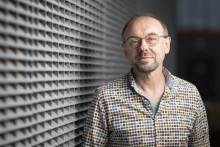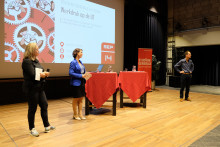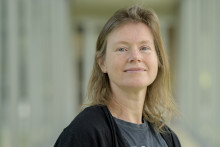How do you look back on the past few days?
Wiendelt Steenbergen: 'It was and is of course very intense. And not only in recent days, but in recent months. The design of the reorganisation plan is something that the faculty board, supported by the HR department, worked on for a long time. And if you then write down certain choices, it is already very intense. But as long as it is only on paper, it is also only on paper. From the moment we had the conversations last week, a whole new reality emerged. You can imagine in advance how people will react, but it always turns out differently. I found the conversations exhausting to do, but the other side of the table had a much harder time, of course, I know that too.'
How do you prepare for something like that?
Steenbergen: 'We did this with the help of the HR department. It is important that you are clear about what is going on and what the consequences are. But also which words you use. So that was definitely something you delve into and think about beforehand.'
And in the meantime, the media is plunging into it...
Steenbergen: 'Yes, that was when we were in the middle of the talks. The Twentsche Courant Tubantia published on Monday evening, RTV Oost spoke with Christian Blum, U-Today followed and of course there was the interview with Jai Prakash on the front page of Tubantia. In those first stories I read a lot of the anger. And that makes sense if you interview people in their emotions. But I also saw a one-sided approach in the various stories. And things that were factually incorrect.'
What was incorrect?
Hans Oeloff: 'The image arose that people had to hand in their pass immediately and were no longer allowed to work. That is instant dismissal, and is not at all an issue in this reorganisation. There are now 47 employees officially threatened with dismissal. It is therefore a letter of dismissal threat. They are exempted from work, but it is not the case that they are sent home. In fact, if they want to continue working in the coming months, they can. This has also been brought to the attention of colleagues. But we also understand that these kinds of rules do not always come across well due to the emotion of the moment.'
Steenbergen: 'And that the term arbitrariness was mentioned. There was absolutely no question of some kind of grab bag. The criteria and choices don't just come out of the blue.'
How did you, as the faculty board, arrive at the criteria for who can stay and who cannot?
Steenbergen: 'Of course, it all started with the financial target, a cut of roughly 7 million euros. Then you won't get there with the so-called cheese slicing method, and you also know that the only option is a reorganisation. As a faculty board, we then started thinking about the faculty we want to be in a slimmed-down form, our profile. We were advised by various people, internal and external. Such as scientific directors, but also the research review committee. At the beginning of 2024, the latter saw a faculty that does a lot in the broad sense of the word. The committee's advice was to bring more focus. We took that advice seriously. So we not only looked at the financial performance of departments, but also at where we as a faculty want to go together. Did the direction of the research fit that profile?'
But no employees of S&T were involved in the search for a new profile?
Steenbergen: 'No, the profile was written by the faculty board, and that was in turn submitted to the scientific directors of the scientific institutes. The departments themselves were not involved. Otherwise, you might have had a situation where people could already start drawing conclusions about their own job, when that didn't even have to be correct.'
And then such a profile is there at some point and then you can see who no longer fits the picture. And they are sometimes very successful scientists...
Steenbergen: 'Yes, that's very bitter. How can you fire people who, for example, have just been awarded an ERC grant? How do you weigh a personal grant from one researcher against a grant for a large consortium that another researcher has brought in? But it wasn't just about that profile. The ratio of education to research was also one of the criteria. So we also looked at the deployment of people in the field of education, which was sharply deployed. In addition, there was a test of the viability of a group.'
'I'm not going to claim that we did everything right' - Wiendelt Steenbergen
Among other things, criticism was levelled at the fact that a relatively large number of female employees were being fired...
Steenbergen: 'We saw that that was the outcome, but we didn't correct it. It is also not legally allowed to do so. But that is definitely a very sour outcome. It obliges us to work on this.'
Why did you choose these departments? Doesn't the UT want to shrink in its support staff?
Steenbergen: 'In terms of support staff, it is already relatively sparsely staffed within Science & Technology, so there was minimal room for cutbacks.'
Oeloff: 'In addition, for almost a year and a half, there has been a focus on letting temporary contracts expire and strict consideration of posting vacancies. It makes the total sum a bit difficult to make, because the reorganisation is not the only cost-cutting measure.'
We are now more than a week further... Looking back, could you have done things differently?
Steenbergen: 'I really think it's too early to say anything about that. There will of course be an extensive evaluation, but we will only do that when the sharpest edges have been removed. I'm not going to claim that we did everything right. These are all personal dramas, but above all we have tried to do it carefully and respectfully.'
Oeloff: 'In every process, you are constantly looking at the areas for improvement. This is of course a very bitter process, but we share a lot and learn from each other. Fortunately, we don't have a routine in this and of course we always try to learn lessons.'
What will happen now to the 47 people who have been threatened with dismissal?
Oeloff: 'We have a dismissal protection period in our collective labour agreement, which is generally three months. After that period, someone's dismissal must be formally requested. In addition, there is a notice period of three or four months – depending on the length of someone's employment. Together that is at least six months and that period starts from 1 March.'

HR director Hans Oeloff.
What kind of guidance does the UT offer the affected employees towards another job?
Oeloff: 'They are immediately registered with the reassignment committee and are supervised by an HR advisor. A guidance plan is drawn up with everyone in accordance with our social regulations. In addition, other facilities are available, such as training and coaching, that employees can use. In any case, we do our best to relocate colleagues either inside or outside the UT and we discuss with them what suits them best.'
Is that without obligation?
Oeloff: 'Employees certainly have the freedom to look outside the UT for a next step. But the moment a reassignment place is available for a suitable position within the UT, it is not without obligation. We assume that everyone wants to keep their job.'
'Every university is going to have to deal with these kinds of difficult choices to a greater or lesser extent' - Hans Oeloff
What about the PhD students and postdocs?
Oeloff: 'They have not been threatened with dismissal, because in their case it concerns temporary contracts. But of course they have a special position in this whole. They have received an email explaining that we will talk to their supervisors about how we can take the PhD projects further. For a few, they will still be able to obtain a PhD within the period of dismissal protection. In other cases, there is more to it. It is really tailor-made for each PhD student or postdoc. For now, there are no dismissals among the PhD students anyway. Only if it turns out to be impossible to follow up on someone's guidance, then we have to enter into consultation.'
Now 47 employees have been threatened with dismissal, but there are also 17 who will keep their jobs, but on whom the reorganisation does have an impact. What happens to them?
Steenbergen: 'We are going to discuss a different embedding in the faculty and I expect that we will come to an agreement fairly quickly. In such cases, it is about working within another group, or part of someone's position has been eliminated and that person has to find a place somewhere else. We want to find a solution to this within the next few weeks, in conversation with the people themselves.'
Is this reorganisation enough for the faculty to become financially healthy again?
Steenbergen: 'We are not going to see any effects this year, but in two to three years' time the effect should be noticeable – purely in terms of financial projection. Look, if there are additional draconian cutbacks on top of it, the story will be different. But for now, we expect this to have the desired effect.'
Oeloff: 'Just this morning I spoke with an HR director at another university. Believe me, they are struggling with exactly the same problems. Unfortunately, this reorganisation is necessary and unfortunately it is not unique to this sector. What you notice from the reports is that this is also a kind of wake-up call for the rest of the country. Every university is going to have to deal with these kinds of difficult choices to a greater or lesser extent.'






